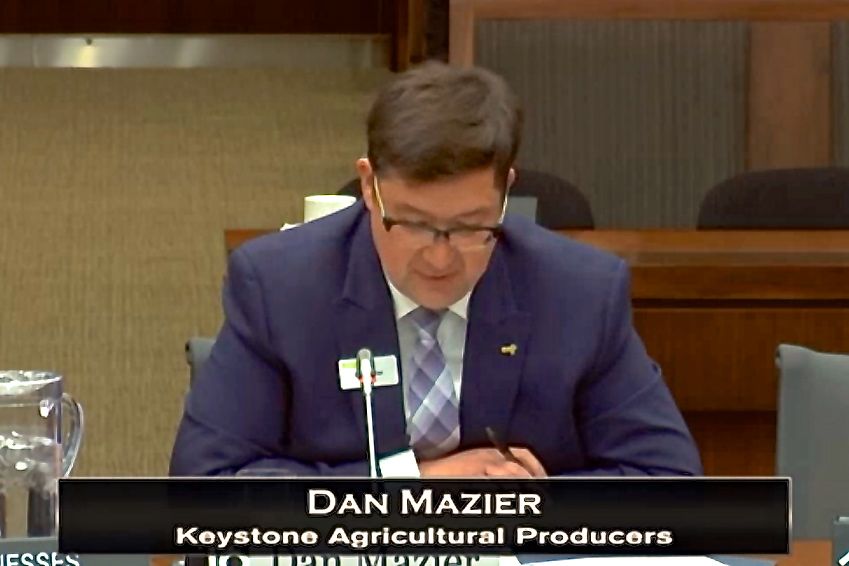Move western grain, ASAP.
That’s the blunt and urgent message Keystone Agricultural Producers (KAP) president Dan Mazier told an emergency meeting of the House of Commons’ agriculture committee Monday in Ottawa.
The 2013-14 grain shipping backlog cost Western farmers around $6.5 billion and the current one will cost billions again, Mazier said.
The first step is to get grain moving, followed by amending and then quickly passing Bill C-49, the Transportation Modernization Act, he said.
“I fully expect the railways to make the investments necessary to get the job done,” Mazier told the committee. “And if it requires that senators and members of Parliament work all day and all night to get Bill C-49 strengthened and passed into law, then I expect that of you as well.”
Read Also

Prairie Wheat Weekly: Prices mostly lower
Cash prices for spring wheat and durum across the Canadian Prairies incurred losses almost across the board during the week ended Aug. 28.
Canadian farmers are forced to invest more in equipment than other farmers because of a short growing season. Sometimes farmers must work day and night for the same reason.
The short-term solution to the backlog is getting more rail workers and locomotives to move more products, Mazier said.
“I would encourage this committee, using all the tools possible, to monitor and support the ministers (Lawrence MacAulay, agriculture and Marc Garneau, transportation) so we can all keep the pressure on the railways to get the backlog cleared,” Mazier said.
KAP also wants C-49 amended to give the Canadian Transportation Agency (CTA) authority to initiate service investigations when it sees fit and order solutions.
Now CTA intervention is only triggered by a formal complaint.
David Emerson’s 2016 report to the federal government on changes to the Canada Transportation Act recommends giving the CTA that power.
“We agree that these measures are necessary to help resolve the service-related challenges that appear to be inherent to a monopolist marketplace like Canada’s grain transportation system,” Mazier said.
KAP also insists soybeans — Manitoba’s third most planted crop at more than two million acres in 2017 — and related products be added to the Schedule II list of grains covered under the Maximum Revenue Entitlement (MRE).
“Currently, the transportation costs for soybeans are as much as 40 per cent higher per car more than MRE-covered grains with still no promise of getting these cars,” Mazier said.
“They are charging more but we’re still not getting those cars in the first place. There is no reason that farmers who have innovated and adapted to changing conditions should be denied the same protection from price exploitation by a monopoly industry that other crops receive.”
KAP also wants amendments to long-haul interswitching to better encourage rail competition to move grain.
The railways must pay a price when they fail to provide service, Mazier said.
“I would like to make one point very clear,” he said. “It is critical that Bill C-49 pass with these amendments before the house rises in June.
“This way shippers and carriers will know what their obligations are under the law and will make the needed investments to ensure that the 2018 crop is delivered to customers on time and we do not suffer the same economic hardships as a country that we have now suffered twice in less than half a decade.”
The 2013-14 grain backlog took the grain industry by surprise, but not this time thanks to data collected by the Ag Transport Coalition (ATC), Mazier said.
At the start of February ATC data show Canadian Pacific and Canadian National Railway (CP, CN) delivered on time 74 and 14 per cent, respectively, of the cars ordered for Manitoba.
“Things only got worse from there,” Mazier said.
In their worst week in February CP delivered 17 per cent of Manitoba ordered cars on time, while CN didn’t deliver any. (However, CN says it did deliver some back-ordered cars then.)
“On average the railways combined only delivered 29 per cent of the cars on the want week for the month of February, which created a backlog of 28,000 cars, leaving more than 30 ships waiting for grain off the coast in the port of Vancouver,” Mazier said.
Committee member and Conservative MP Luc Berthold criticized the Liberal government for failing farmers by not taking grain transportation issues out of C-49 and putting them into a separate bill, which could’ve been passed sooner.
John Barlow, also a committee member and Conservative MP, said Conservatives on the Commons agriculture and transportation committees tried to address farmers’ rail shipping concerns but the Liberals voted the measures down.
Doubling the annual limit on cash advances to $800,000 could help some farmers who haven’t been able to deliver much grain due to the backlog, Canadian Canola Growers Association CEO Rick White told the committee.
Earlier the Commons committee also heard from CN and CP, the Canadian Federation of Agriculture, G3 Canada, the Western Grain Elevators Association, Grain Growers of Canada, Agricultural Producers Association of Saskatchewan, Alberta Wheat Commission and Western Canadian Wheat Growers Association.
— Allan Dawson is a reporter for the Manitoba Co-operator at Miami, Man. Follow him at @AllanReporter on Twitter.














